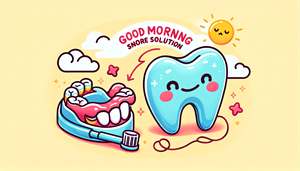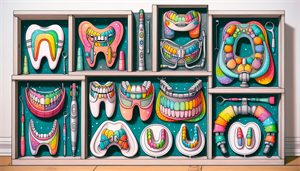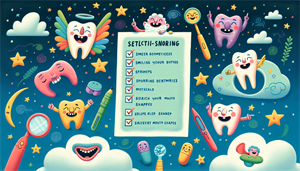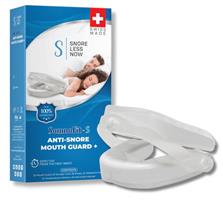Finding a snoring mouthpiece for denture wearers that works with dentures can be difficult. This article will introduce you to effective solutions that provide comfort without interfering with your dentures.
Key Takeaways
-
Denture wearers face unique challenges with traditional anti-snoring mouthpieces, as these devices need stable teeth for support, making them often unsuitable.
-
The Good Morning Snore Solution is a recommended alternative for denture wearers, utilizing a tongue-retaining mechanism that won’t interfere with dentures.
-
Consulting with a dentist is essential for finding the most suitable anti-snoring device and maintaining oral health while using these products.
Understanding Snoring and Dentures

Snoring occurs when the muscles in your throat relax during sleep, causing the tongue and throat tissues to vibrate and create that familiar snoring sound. This restricted airflow can be due to several factors, including a thick soft palate, chronic congestion, or anatomical issues.
For denture wearers, these problems can be exacerbated, leading to more frequent or louder snoring.
Wearing dentures comes with its own set of challenges, especially when it comes to dealing with snoring.
Denture wearers often experience a different kind of airflow restriction, which can complicate snoring issues. Even without natural teeth, individuals can still use anti-snoring mouthpieces. However, the type of device used must be carefully chosen to ensure it does not interfere with the dentures or cause discomfort.
Snoring is not just a minor inconvenience; it can be a symptom of obstructive sleep apnea (OSA), a serious condition where the airway becomes blocked during sleep, leading to interrupted breathing. This can cause a range of health problems, from daytime fatigue to more serious cardiovascular issues.
Those who sleep on their back are particularly susceptible to snoring because the tongue can fall backward and block the airway more easily in this position.
Grasping these dynamics helps in finding effective snoring solutions, particularly for denture wearers. With the right approach, snoring can be managed, leading to better sleep and overall health.
Challenges of Using Traditional Anti-Snoring Mouthpieces with Dentures

Traditional anti-snoring mouthpieces, particularly a mandibular advancement device, are generally not suitable for denture wearers. These devices work by holding the lower jaw forward to keep the airway open, but they rely heavily on healthy upper and lower front teeth for stability. For those with full dentures, this can pose a significant problem as the device cannot properly attach without natural teeth.
For denture wearers, using MADs can lead to several complications. These devices may dislodge or interfere with the dentures during use, which can make them ineffective and uncomfortable. Additionally, oral appliances like MADs can cause side effects such as drooling, jaw discomfort, and temporomandibular joint (TMJ) issues. Continuous nightly use is essential for these devices to prevent snoring or sleep apnea, but this can be particularly challenging for those with dentures due to the stability issues.
Another challenge is the discomfort that can come from using these devices. The pressure and fit required for MADs can lead to sore gums and potential damage to the dentures themselves. Given these issues, knowing the limitations and challenges of traditional MADs is crucial for making an informed decision about snoring treatments.
Traditional anti-snoring devices aren’t always the best choice for denture wearers. This is where alternative solutions, designed specifically for those with dentures, come into play. Exploring these alternatives can provide effective relief without compromising comfort or dental health.
Good Morning Snore Solution for Denture Wearers

The Good Morning Snore Solution offers an innovative alternative for those who wear dentures. Unlike traditional MADs, this tongue retaining device features a tongue-retaining mechanism that does not rely on teeth for support. This design makes it especially suitable for denture wearers, providing an effective means to reduce snoring without interfering with dental work.
Priced at $89.94 USD, it is a cost-effective solution recognized for its efficacy and comfort.
How Good Morning Snore Solution Works
The Good Morning Snore Solution functions by holding the tongue forward to keep the airways open. This is achieved through a suction mechanism that securely attaches to the tip of the tongue using a suction bulb. Preventing the tongue from falling back and obstructing the airway effectively reduces snoring and helps achieve a good night’s sleep.
Users might initially experience an odd sensation when using the Good Morning Snore Solution due to the suction mechanism. However, this usually subsides as they get accustomed to the device. The principle of keeping the airway open applies here as with other anti-snoring devices, but with the added advantage of not needing teeth for support.
This device alleviate snoring and addresses obstructive sleep apnea by ensuring the airway remains open throughout the night. It’s a simple yet effective solution for those who struggle with traditional anti snoring mouthpieces.
Benefits for Denture Wearers
One of the primary benefits of the Good Morning Snore Solution for denture wearers is its lightweight and universal fit. Unlike other devices that need to be anchored to the teeth, it rests on the outside of the lips, making it comfortable for those with partial or full dentures. This design minimizes the risk of dislodging the dentures or causing discomfort during sleep.
The Good Morning Snore Solution is made from medical-grade, BPA-free silicone, which ensures both safety and comfort. This material choice is particularly important for those with sensitive gums or other oral health concerns. Moreover, the device is accessible as it generally does not require a prescription, making it an easy-to-obtain solution for most people.
However, there are some potential drawbacks. For instance, the device may protrude from the mouth, which can be uncomfortable for stomach sleepers. Additionally, those who cannot breathe comfortably through their nose might find it unsuitable.
Overall, the Good Morning Snore Solution offers a practical and effective snoring treatment for denture wearers, without the complications associated with traditional MADs.
Other Anti-Snoring Devices for Denture Wearers

Aside from the Good Morning Snore Solution, there are other anti-snoring devices that can be effective for denture wearers. Nasal strips, for example, can help open nasal passages and improve airflow during sleep, reducing snoring without affecting denture stability. These strips are easy to use and widely available, making them a convenient option.
Positional therapy devices are another alternative that encourages side sleeping, which can significantly reduce snoring and treat snoring. These devices work by making it uncomfortable to sleep on your back, thus promoting a sleeping position that helps keep the airway open. This method does not interfere with dentures and can be a simple yet effective solution.
Provent devices, which use a small valve to filter air, can also be suitable for denture wearers. These devices create positive airway pressure that helps keep the airway open during sleep. They are easy to use and do not rely on the teeth or gums, making them a good alternative for those with dentures.
Each of these alternatives offers different benefits and can be chosen based on individual preferences and needs. They provide a range of options for denture wearers seeking effective snoring solutions without compromising on comfort or dental health.
Consulting with a Dentist
Before choosing any snoring mouthpiece, it is crucial to consult with a dentist or physician to determine the most suitable option. This is especially important for those who wear dentures, as individual needs can vary significantly. A professional consultation can help identify the best anti-snoring device based on specific oral health conditions and personal preferences.
Elderly individuals without teeth are often more prone to obstructive sleep apnea due to anatomical changes. Consulting with a healthcare provider can help address these issues and find the most effective treatment. Additionally, practices regarding whether edentulous patients should wear dentures at night vary widely, so professional advice is essential.
Regular check-ups with a sleep dentist are also important to ensure the device fits properly and is not causing any damage to the oral tissues. These annual visits can help monitor the condition of the device and make necessary adjustments to maintain its effectiveness and comfort.
Generally speaking, working closely with a healthcare provider ensures that the chosen snoring treatment is both safe and effective, providing peace of mind and better sleep quality.
Tips for Choosing the Right Anti-Snoring Device

Choosing the right anti-snoring device involves considering several factors. Your lifestyle should play a significant role in this decision, particularly in terms of portability and ease of use. For instance, if you travel frequently, you might prefer a device that is compact and easy to carry.
Reading reviews from other users can provide valuable insights into the effectiveness and comfort of different devices. These firsthand accounts can help you understand what to expect and identify potential issues before making a purchase.
It’s also important to be aware of the potential side effects of anti-snoring devices. Some devices may cause discomfort, nausea, or other issues that could affect your willingness to use them consistently. Understanding these side effects can help you make a more informed decision and choose a device that you are more likely to use regularly.
Considering these factors helps in finding the best anti-snoring mouthpiece that suits your needs and preferences, ensuring both effectiveness and comfort. Understanding how anti snoring mouthpieces work can also aid in your decision-making process.
Maintaining Oral Health with Dentures and Anti-Snoring Devices
Maintaining oral health is crucial when using anti-snoring devices, especially for denture wearers. Wearing dentures at night can potentially lead to open bite and mouth breathing, which may worsen obstructive sleep apnea. Therefore, following best practices for oral health is crucial.
To avoid issues, do not use toothpaste on oral appliances as it can cause scratches that harbor bacteria. Instead, use recommended cleaning solutions and regularly clean the storage container to prevent odor and bacterial growth. Soaking the device in cleaning solutions should be limited to no more than 10 minutes weekly to avoid damage.
Keeping the device away from pets is also crucial, as they might chew on it. Additionally, to prevent discoloration, drink only water while wearing the dental device.
By following these tips, you can ensure that both your dentures and anti-snoring devices remain in good condition, providing effective snoring relief without compromising your oral health.
Summary
Finding the right anti-snoring solution for denture wearers can be challenging, but it’s not impossible. The Good Morning Snore Solution offers a unique and effective alternative to traditional MADs, making it a great choice for denture wearers. Consulting with a dentist and considering other anti-snoring devices can also help you find the best solution for your needs. By maintaining good oral health and choosing the right device, you can achieve better sleep and overall well-being.
Frequently Asked Questions
Can denture wearers use traditional anti-snoring mouthpieces?
Denture wearers should avoid traditional anti-snoring mouthpieces because they depend on healthy teeth for stability, which isn't the case for those with dentures. It's best to look for options specifically designed for denture users instead.
How does the Good Morning Snore Solution work?
The Good Morning Snore Solution works by using a suction mechanism to hold your tongue forward, which helps keep your airway open and significantly reduces snoring. It's a simple and effective way to improve your sleep quality!
Are there other anti-snoring devices suitable for denture wearers?
Definitely! Denture wearers can benefit from alternatives like nasal strips, positional therapy devices, and Provent devices to help with snoring.
Why is it important to consult a dentist before choosing an anti-snoring device?
It's crucial to consult a dentist before choosing an anti-snoring device to ensure it's tailored to your unique oral health and needs. This can help prevent complications and maximize effectiveness for a better night's sleep.
How can I maintain my oral health while using anti-snoring devices?
To keep your oral health in check while using anti-snoring devices, avoid using toothpaste on them, clean them regularly, and store them safely away from pets. Your smile will thank you!


